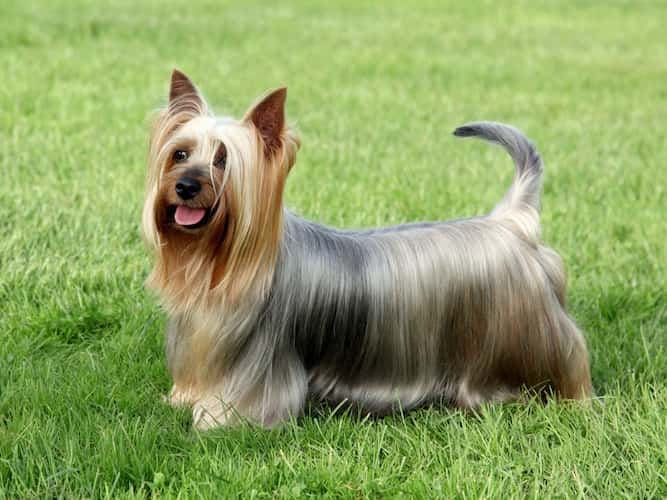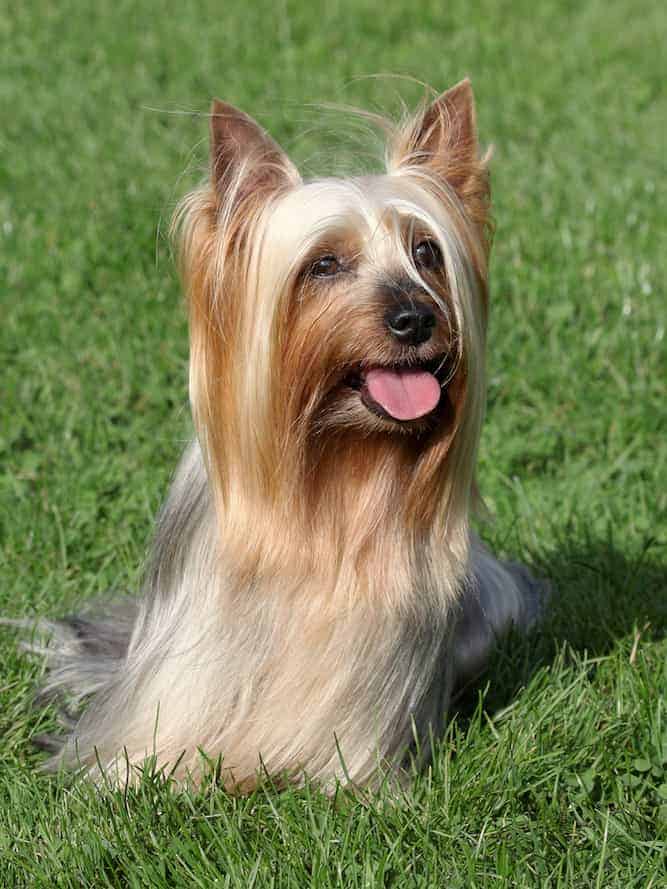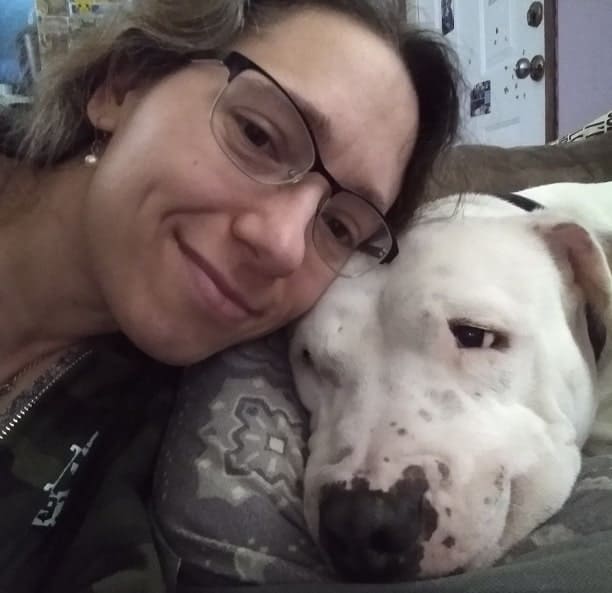Hailing from Australia in the 1890s, the Silky Terrier temperament is joyful and inquisitive.

Silky Terrier Temperament and Personality
Meet the Silky Terrier temperament and find out if this is the perfect terrier for you. You'll also learn what to expect from this breed: the good and the bad.
Terriers are smart energetic and sometimes a handful so pay close attention before you decide on this breed.
Friendly, spirited, and intelligent
The Silky Terrier's friendly nature means they are not nervous or shy around new people.
Silky Terriers love their humans. They are happiest when part of family activities.
I really can’t say it enough: a Silky is a people-person kind of dog to the nth degree. This is not the kind of dog you can just open the back door, let him out, and leave him to his own devices.
On a related note, you can’t leave the Silky alone for long periods of time, or he can become anxious and have accidents on the carpet.
Separation anxiety is a problem for this breed, so if you have the kind of schedule that keeps you away from home for hours at a time, this might not be the right breed for you.
They can be bossy
Another Silky Terrier temperament trait is bossiness. Silkies have that assertive “terrier temperament” that can come across as bossy.
Digging and chasing are some of their favorite activities
Silky Terriers, in true Terrier fashion, love to dig. They love to chase, and they are quick – so a securely fenced-in yard is a must. If you have a problem with digging, read here.
This is a dog who is happiest when he is busy. Make sure you help him channel that hyperactivity for good, or he will certainly rely on his digging and chasing habits to expel it.
They get along with (older) children
The Silky Terrier dog is a great family pet – especially if you raise them with kids. However, they have a strong personality, so families with children over 10 years old are best.
Silkies are also small, so a young child could accidentally drop him or play too rough with him.
They can also get along with Other Dogs
Silky Terriers get along very well with other dogs if you raise them together. Early socialization is key. Without it, you will have a much tougher time with your dog.
He may become overly suspicious of or timid around strangers – this goes for both human strangers and dog strangers.
There may, however, be some rivalry for treats or attention if you have another dog in the house. You can train him to understand that his time for treats and attention will come too, just as it has for your other dog.
There does exist the natural inclination for him to fight with other dogs of his same gender. This is common for many other breeds. The more you socialize him, though, the better he should be. Click here to learn how you will deal with dog-on-dog aggression here.
Prey Drive
Their true Terrier heritage means they love to chase small animals. A home without cats or other small animals is probably best.

Silky Terriers are energetic
This is a high-spirited, energetic breed. They are always up for an adventure and love a good challenge. In fact, you may be downright shocked to see how long this little dog can go before he needs a break.
If you don’t have a large yard, or even much of a yard at all, don’t worry. With enough exercise, the Silky Terrier does well in apartments, as well as yards.
They make excellent watchdogs
Make no mistake, the Silky Terrier makes a great watchdog. He will certainly let you know with that high-pitched bark of his when someone has come around who is not welcome.
People have even accused Silkies of barking too much! But this is definitely a dog who is all bark and no bite – they’re too small to be effective guard dogs.
This is more the kind of dog who will say “hey, Mommy or Daddy, I’ve found a problem you have to deal with!”, rather than take matters into his own paws.
Quick Silky Terrier History
Australian breeders crossed the Yorkshire Terrier and native Australian Terrier to create the Silky Terrier.
Breeders wanted to combine the body of an Australian Terrier with a coat of a Yorkshire Terrier.
Like their Terrier ancestors, Silky Terriers – also called Silkies – were bred for hunting small vermin.
The Silky made his first appearance in the U.S. when soldiers brought the dogs back with them after World War II.
How Do You Train a Silky Terrier?
Although they are intelligent, the Silky Terrier’s self-assured temperament can make training difficult.
Silky Terriers require firm yet gentle training. Housetraining can be a challenge but with consistency and repetition, they will learn.
Keep training sessions fun and full of positive reinforcement. Food and praise work wonders but try to go lighter on the former and heavier on the latter. The last thing you need is an obese dog and the health problems that come along with it.
The Silky Terrier breed can also be possessive when it comes to food and toys. Teach them that it is okay to share as soon as possible to avoid this.

Socialize your Silky Terrier to as much as possible. This will teach him to be a calm, friendly adult. Unsocialized Silkies can be overly suspicious of strangers.
Helpful Dog Training Resource:
The Online Dog Trainer by Doggy Dan a world-class Dog Trainer from New Zealand is worth taking a look at. This online resource has hundreds of fun informative dog training videos that can help you learn the basics and more.
Finding the Perfect Silky Terrier
Ready to add one of these feisty pups to your family? You’re certainly in for a treat.
To figure out whether you’d like to purchase a Silky Terrier for sale from a breeder or adopt one from a rescue organization, consider your lifestyle.
Silky Terrier puppies are cute – but they are also puppies. They require time, dedication, and patience.
Don’t have time to train a puppy? Consider adoption. Silky Terriers in shelters are often older and trained.
The Silky Terrier Club of America is a great tool to help you find the perfect Silky Terrier.
Silky Terrier Puppies for Sale
Purchasing a Silky Terrier puppy from a breeder will cost between $600-$800 but can go up to $1000-$2000, depending on the dog’s lineage.
The Silky Terrier price is dependent on demand, litter availability, and location.
Expect to pay more for Silkies with an American Kennel Club (AKC) champion bloodline.
Silky Terrier Rescue and Adoption
If you have decided on Silky Terrier adoption, your first stop should be the Silky Terrier Rescue website.
Not only do they have Silky Terriers available for adoption, but they also share success stories and have adoption FAQ.
Adoption is also a great choice for those looking for a Silky Terrier mix. Shelters often have more mixes than purebreds available.
Mixed breeds are perfect for families looking for several different personality traits rolled into one dog.
Silky Terrier Breeders
To find Silky Terrier breeders, check out the AKC Marketplace. The AKC Marketplace allows you to search for Silky Terrier breeders based on location, breeders of distinction, champion bloodlines, and whether puppies are available.
Choose several breeders in your area and plan visits.
Always meet a breeder prior to committing and bring a list of questions. Reputable breeders will be able to answer your questions with confidence.
A good dog breeder should also ask you questions in return to see if Silkies are the right breed for you.

Silky Terrier vs. Yorkshire Terrier
There are quite a few differences between the Silky Terrier and his Yorkshire Terrier cousin. Some of these differences are physical, while others relate to temperament.
Here, let’s focus on temperament.
Silkies and Yorkies are both loving dogs with enjoyable personalities.
They’re both energetic and friendly dogs, though Silkies can be more aggressive than Yorkies.
While this is fixable, this means that you’ll need to spend more time training a Silky than a Yorkie, and you’ll need to be firmer when you do.
One slight difference is that Yorkies tend to learn things faster than Silkies do. One thing they do seem to struggle with, though, is housebreaking.
Silkies are more energetic than Yorkies, so you’ll need to exercise them more. Yorkies tend to poop out faster than Silkies do, and they’re also gentler than Silkies are.
The Debate Over Cropped Ears vs. Natural Ears
You may notice that some Silkies have cropped ears, while others don’t. Why is that, you may ask?
The practice of cropping ears and tails tends to be a requirement of the AKC for certain breeds, else the AKC can deem those dogs as ineligible to win at a dog show.
However, some argue that the practice is barbaric and should stop.
The AKC’s standard for the Silky Terrier specifies that only his tail be docked, though some breeders will crop the ears, too.
Other breeders have refused to partake, following in the footsteps of the Europeans, who flat-out ban the practice. This has, over the years, lead to changes in what the AKC requires insofar as cropped ears and docked tails.
Caring for a Silky Terrier
The Silky Terrier lifespan is between 13-15 years.
A Silky Terrier weight is around 10 pounds and they are between 9-10 inches tall.
It's important to know what is healthy weight and height for the Silky Terrier or any dog for that matter.
With that baseline, you can judge what an underweight or obese Silky Terrier looks like and take steps to address it before your got suffer an illness due to poor nutrition.
Silky Terrier HealthThe Silky Terrier is prone to certain health conditions like:
- Legg-Calve-Perthes disease – a hip joint disease
- Diabetes
- Patellar Luxation – a knee condition
- Epilepsy,
- And a Tracheal Collapse – often seen in small breeds, it affects their airways.
Helpful Dog Health Resouce:
Note: As you can see above your Silkies are prone to suffering from quite a few serious ailments. It's highly recommended that you get a guide such as The Ultimate Guide to Dog Health to keep at home. While this won't replace your vet it is a good companion that helps you prevent some of these issues before they turn into full-blown pain and sickness for your Silky.
Exercise
They may be small, but Silky Terriers need a moderate amount of exercise. In fact, they require more exercise than most of the toy group breeds.
Daily exercise is a requirement for this breed.
They do well with an owner who knows how to channel their energy into daily walks, playtime, and even training for sports.
How Do You Groom a Silky Terrier?
Silky Terriers have a striking coat – it’s long and sleek with a part down the back. However, despite their long coat, the Silky Terrier doesn’t shed much. For this reason, you can actually have a Silky Terrier around if you’re normally allergic to dogs.
While no dog is truly “hypoallergenic,” you are less likely to have a reaction from a dog who doesn’t shed much, like the Silky Terrier.
As for colors, they typically come in rich tan, with various shades of blue.
Contrary to what you might think, Silky Terrier grooming isn’t all that high maintenance.
A thorough brushing two to three times per week, as well as before bath time, is all they need. A bath just about every month will keep them clean and free of tangles.
Most owners decide to keep the hair long, but Silky Terriers with short hair is another option – especially if you don’t have time for two to three brushes per week! In fact, I recommend that you do, in fact, trim his coat, as this will help keep it cleaner.
Trim their nails once or twice a month.
Check their ears weekly for any bad odor or redness, as that is a sign of infection.
A Final Word about the Silky Terrier Temperament
With their small stature and feisty personality, the Silky Terrier dog temperament makes this dog a wonderful family companion – especially those in apartments.
Though bossy, Silky Terriers are intelligent, and you can train them with proper guidance. You’ll also want to train them not to dig or chase, as these traits are inherent to the Silky Terrier’s personality.
The Silky Terrier is a hugely friendly and affectionate dog. He is great with children, and he will fill your home and life with laughter and love.
If you’re looking for a self-assured personality in a pint-sized body, the Silky Terrier is for you!

Kailyn has worked as a professional freelance writer since 2012, and during that time she has written about nearly every dog breed imaginable. Her mother loved Collies, and so Kailyn grew up with three of them throughout her childhood – including a blonde one who was half-blind! Now her home belongs to her first official dog, Macho, a Dogo Argentino rescue.